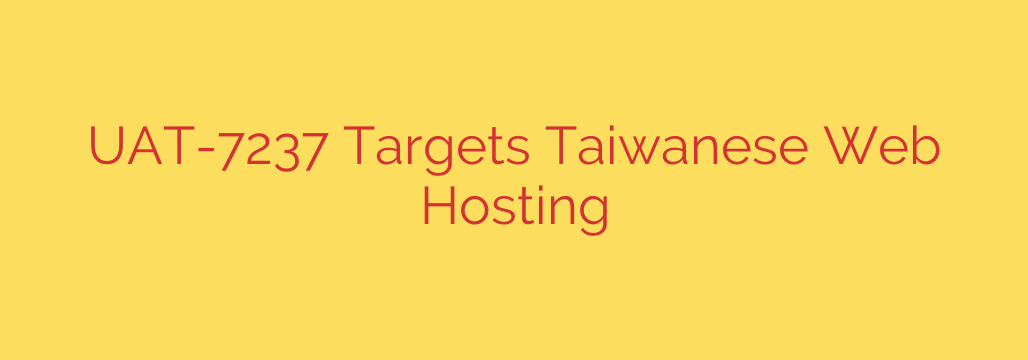
Taiwanese Web Hosting Providers Targeted by Sophisticated Espionage Campaign
A newly identified cyber threat is actively targeting Taiwanese web hosting companies in a sophisticated supply-chain attack designed for espionage and widespread data theft. This campaign, carried out by a hacking group tracked as UAT-7237, leverages compromised web servers to gain access to the sensitive data of their clients, including government, military, and educational organizations.
This calculated approach highlights a dangerous evolution in cyberattacks. Instead of targeting organizations directly, the attackers focus on their web hosting providers. By compromising a single web host, they can potentially gain unauthorized access to hundreds or even thousands of downstream client websites and servers, creating a massive security breach from a single point of entry.
The Anatomy of the Attack
The initial infiltration appears to rely on exploiting known vulnerabilities in public-facing web applications. Evidence suggests that SQL injection vulnerabilities are a primary method of entry, allowing the attackers to bypass initial security measures and gain a foothold within the target network.
Once inside, the threat actors deploy a custom arsenal of malicious tools designed to maintain persistence and steal information. These tools include:
- Custom Web Shells: The group uses two primary web shells, named HYPERSIMPLE and GHOSTSTREAM. These shells act as a backdoor, allowing the attackers to execute commands remotely, upload or download files, and manage the compromised server without being easily detected.
- A Sophisticated Backdoor: A custom backdoor known as PHOTON is deployed to ensure long-term access. This tool helps the attackers maintain control over the system even if the initial vulnerability is patched or the web shells are discovered and removed.
- Credential Theft: To move deeper into the network, the attackers use well-known credential harvesting tools like Mimikatz. This allows them to steal administrator passwords and other sensitive credentials stored on the compromised machines, enabling them to access other systems across the network.
The Ultimate Goal: Espionage and Watering Hole Attacks
The primary objective of this campaign is clear: espionage. By infiltrating web hosts that serve critical sectors, the attackers can steal sensitive information from government agencies, military contractors, and academic institutions.
Furthermore, the compromised websites pose a significant risk for becoming platforms for “watering hole” attacks. In this scenario, the attackers can modify legitimate, trusted websites to infect their visitors with malware. An unsuspecting user visiting a familiar government or news website could have their own computer compromised, further spreading the attackers’ reach. The tactics, techniques, and specific targeting of Taiwanese entities suggest a potential alignment with state-sponsored threat actors.
How to Strengthen Your Defenses: Key Security Measures
This campaign serves as a critical reminder for all organizations, especially web hosting providers and their clients, to prioritize cybersecurity. Proactive defense is the only effective strategy against such advanced threats.
Here are essential security measures to implement immediately:
- Prioritize Patch Management: Regularly scan for and immediately patch vulnerabilities in all public-facing applications and systems. Unpatched software is the most common entry point for attackers.
- Enforce Strong Credential Policies: Move away from simple password-based security. Implement Multi-Factor Authentication (MFA) wherever possible, especially for administrative accounts and remote access portals.
- Implement Network Segmentation: Isolate critical servers and databases from the rest of the network. This can prevent attackers from moving laterally and accessing sensitive data even if they breach an initial server.
- Continuously Monitor Network Activity: Actively monitor for unusual processes, unexpected outbound connections, and signs of web shell activity. Early detection is crucial for minimizing the damage from a breach.
- Conduct Regular Security Audits: Proactively hunt for threats and vulnerabilities within your network. Hire third-party penetration testers to identify weaknesses before attackers can exploit them.
The threat posed by groups like UAT-7237 is persistent and advanced. For businesses in Taiwan and beyond, maintaining a vigilant and robust security posture is not just a best practice—it is essential for survival.
Source: https://blog.talosintelligence.com/uat-7237-targets-web-hosting-infra/








